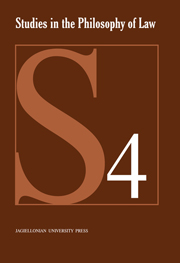Book contents
- Frontmatter
- Contents
- Preface
- Six Causes of the Dispute over Legal Bioethics
- Bioethics and Legal Philosophy
- The Outline of the Subject of Biojurisprudence
- Law and Biotechnology
- The Ethical Significance of Evolution
- Human Nature after Darwin
- The Notion of the Person in Bioethical Debates
- The Roots of Normativity. From Neuroscience to Legal Theory
- Why No One Should Ever Win the Nobel Prize: Neurolaw, Reward and Punishment
- Is There Anybody Who Really Wants to Live Forever? The Significance of Mortality
- The Slippery Slope Arguments Against the Legalization of Physician-Assisted Suicide
- Ethical Problems of Hematopoietic Stem Cells Transplantation
- Notes about the Authors
The Notion of the Person in Bioethical Debates
Published online by Cambridge University Press: 05 September 2014
- Frontmatter
- Contents
- Preface
- Six Causes of the Dispute over Legal Bioethics
- Bioethics and Legal Philosophy
- The Outline of the Subject of Biojurisprudence
- Law and Biotechnology
- The Ethical Significance of Evolution
- Human Nature after Darwin
- The Notion of the Person in Bioethical Debates
- The Roots of Normativity. From Neuroscience to Legal Theory
- Why No One Should Ever Win the Nobel Prize: Neurolaw, Reward and Punishment
- Is There Anybody Who Really Wants to Live Forever? The Significance of Mortality
- The Slippery Slope Arguments Against the Legalization of Physician-Assisted Suicide
- Ethical Problems of Hematopoietic Stem Cells Transplantation
- Notes about the Authors
Summary
Trilemma
When bioethical discussion touches on the notion of the person it usually takes the form of an argument which has a decisive character. Such an understanding often forms a simple syllogism: one should not kill a person; X is a person; therefore: one should not kill X with, in the place of X – according to the problem considered – terms such as nasciturus, ‘someone terminally ill who has requested euthanasia,’ ‘someone who's life functions are maintained by medical apparatus’ are employed.
On the other hand, one may also encounter such positions as that noted by Hugo Engelhardt:
Not all people are equal. (…) Not all people are persons. Not all people are conscious, understanding and able to praise or criticise something. A foetus, a newborn, the mentally handicapped, those in a deep coma – are examples of people who are nonpersons.
We should note that Engelhardt does not question the syllogistic scheme above. He rejects the validity of one of its premises i.e. that a nasciturus or someone who is mentally handicapped is a person. It is not the aim of this paper to establish if the conclusions of this syllogism are true or false. We can state, however, that they are not justified on the basis of the premises assumed. The reason is not that the premises are false but rather that it is unclear what they state.
- Type
- Chapter
- Information
- Studies in the Philosophy of LawLegal Philosophy and the Challenger of Biosciences, pp. 85 - 96Publisher: Jagiellonian University PressPrint publication year: 2010



